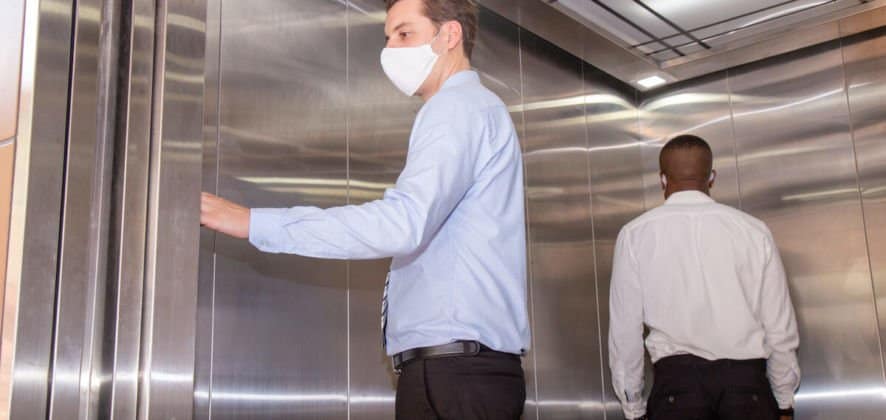Elevator Continuous Purifying & Disinfection Technology in the Age of COVID-19

CASPR: An International Health Technology Innovator
Commercial elevators are necessary, but how can you ensure the safety of your passengers in such constricted spaces? You may be cleaning the touch points, but have you thought about disinfecting the air to protect yourself against bacteria, viruses, and mold? These questions are likely on everyone’s mind in light of COVID-19, especially when it comes to tight spaces where social distancing may not be possible.
The CASPR Group has an answer.
The health technology innovator, whose acronym stands for Clean Air & Surface Pathogen Reduction, provides products aimed at reducing pathogens found in the environment and the surfaces we touch. In other words, their goal is to replicate the naturally occurring process that you find with outside air.
CASPR has been providing a line of touch-free disinfection technology products for almost two decades throughout Europe, South America and Asia. That same technology was introduced to healthcare settings in the United States in 2016. It was also tested in a few fitness studios, but expanding to elevators wasn’t a consideration until COVID-19 became a global pandemic and everyone was forced to re-consider their physical surroundings — especially constricted spaces with poor, limited airflow.
Ensuring Safety in Constricted Spaces
CASPR knew the continuous disinfectant technology worked in the healthcare industry, because they had the data and third-party testing to substantiate their findings, including up to a 99.96% kill rate on surfaces. It was proven effective against a host of airborne and surface-level pathogens, including bacteria, viruses, mold, odors and volatile organic compounds (VOCs). Although this disinfection technology was not specifically developed for COVID-19, the technology has proven effective against similar coronaviruses, such as SARS and H1N1.
The product, the CASPR 200e, coverts humidity in the air from H2O (water) to H2O2 (hydrogen peroxide). The continuous disinfectant technology uses special UV lighting and a photocatalyst to create the advanced oxidation process. It’s silent, easy to install and designed for a space of up to 200 square feet.
CASPR knew this innovative technology had the potential to expand beyond healthcare and benefit other commercial environments where proper airflow is especially a challenge, such as elevators — and that opportunity came sooner rather than later with the arrival of COVID-19.
At the beginning of the pandemic, Stanley Elevator recommitted to the safety of their solutions and services, and they reached into their deep industry connections to partner with CASPR. The goal was to test and hopefully implement an effective disinfecting technology designed for commercial elevators. CASPR welcomed the opportunity to work with a local, highly reputable New England business that offered innovative and leading-edge solutions.
Stanley Elevator and CASPR first tested the product in 10 elevators. They selected a variety of settings in Massachusetts, including apartment buildings and college campuses, and the results were a huge success. All 10 sites showed dramatic reductions of up to 99% in pathogen levels on all high touch surfaces and in the air. This mirrored what they have seen in the healthcare industry.
Proven Technology that Adds Another Layer of Protection
CASPR is now working with Stanley Elevator to distribute the disinfecting technology to its customers. Numerous colleges and universities have also expressed interest in the product.
John LaRochelle, Chief Executive Officer at Environmental Infection Prevention, a third-party company that tested and verified the results, stressed the importance of this technology because in many cases, such as multi-story buildings or apartment complexes with senior citizens, elevators are required. But it’s difficult to maintain your personal space in such a confined area.
“Elevators create an impossible social distancing situation,” he said. “This technology helps create another level and layer of risk mitigation.”
Even though elevators may be cleaned daily, they contain numerous high-touch areas such as call buttons, hand rails and doors that will accumulate germs throughout the day. Plus, most cleanings don’t include air purification.
The difference with the CASPR 200e is that it continually reduces air pollution and illness-causing pathogens on surfaces (such as call buttons, handrails and floors), ensuring the same high level of safety for every elevator passenger — no matter the time of day or night.
LaRochelle also believes COVID-19 has likely altered the way we think about cleaning and disinfecting — similar to how 9/11 changed security with their airline industry. Elevators are essential, and another added layer of protection may become the standard, ensuring that customers feel more comfortable in such a constricted space.
“If one elevator has protection and another one doesn’t, which would you rather use?”
A Dedicated Partnership Committed to Commercial Elevator Safety
Stanley Elevator and CASPR have formed a dedicated partnership that’s committed to the ongoing safety of commercial elevators and their passengers. The revolutionary CASPR 200e is a safe, discreet and silent technology designed to remove a variety of airborne and surface-level pathogens, many of which are contagious and can lead to illness.
The safety and security of restricted spaces is especially important as we continue to navigate COVID-19. With this proven disinfecting technology, Stanley Elevator and CASPR are dedicated to providing an added level of cleanliness and safety for all elevator customers — now and in the future.
For a complete report of the data, contact Stanley Elevator.